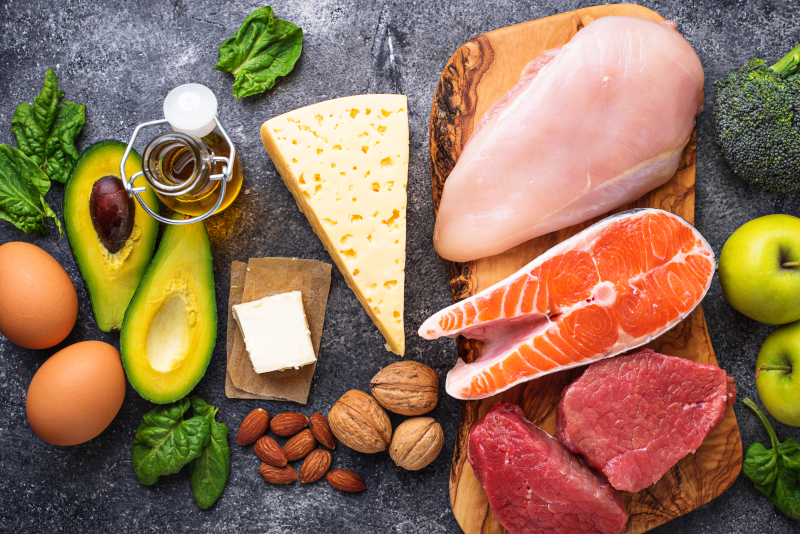Boost Your Metabolism with OMAD for Effective Weight Loss
Regarding optimizing your metabolic health, the concept of One Meal A Day (OMAD) has attracted significant attention in recent years. Combining the ketogenic diet and OMAD intermittent fasting can lead to impressive weight loss results while promoting overall well-being.
Discover the science behind how intermittent fasting boosts metabolism and explore factors that influence the metabolic rate when doing OMAD.
Learn about the difference between low-calorie diets with low-carb diets, examining their respective caloric intake levels and fat-burning potential.
Intermittent Fasting and Metabolism
One of the most popular trends in health and nutrition is intermittent fasting, specifically eating only one meal a day (OMAD).
This dietary pattern has been linked to various health benefits, such as weight loss, improved well-being, and even increased life expectancy.
The Science Behind Intermittent Fasting and Metabolism
When you practice intermittent fasting, your body undergoes several physiological changes that can impact your metabolism.
One significant change is a decrease in insulin levels during the fasting period. Lower insulin levels allow your body to access stored fat more efficiently as an energy source instead of relying on glucose from carbohydrates.
In addition to improved fat-burning capabilities, studies have also shown that intermittent fasting may increase the metabolic rate by up to 14 percent through enhanced production of norepinephrine – a hormone responsible for stimulating thermogenesis or heat production.
This boost in metabolism can help you burn more calories throughout the day while maintaining muscle mass.
Factors That Can Influence the Metabolic Rate
Diet:
Consuming plenty of healthy fats and moderate amounts of protein during one meal can help preserve lean muscle mass, which is crucial in maintaining metabolic rate.
Fitness level: Regular physical activity helps maintain or improve your metabolic rate by increasing muscle mass and overall body composition. Combining OMAD with a consistent exercise routine can further optimize metabolism and weight loss results.
Duration of fasting: The length of your fasting window may also impact your metabolic rate. Shorter fasts (16-20 hours) have increased metabolism, while longer fasts (24+ hours) could slow the metabolic rate due to reduced energy intake.
Practicing OMAD can positively influence your metabolism regardless of your metabolic body type by promoting fat-burning, increasing thermogenesis, and preserving lean muscle mass.
However, it’s essential to consider factors such as diet composition, fitness level, and duration of fasting when implementing this approach to maximize its benefits on metabolic health.

Low-Calorie Diets vs. Low-Carb Diets
Regarding weight loss and metabolism, two popular diet types are often considered: low-calorie diets and low-carb diets, such as the ketogenic diet.
In this section, we will compare these two approaches in terms of their impact on metabolism by examining calorie consumption, fat-burning potential, hunger levels, and cravings associated with each.
Low-calorie diets versus Ketogenic Diets
A low-calorie diet focuses on reducing overall caloric intake to create a deficit that can lead to weight loss. On the other hand, a ketogenic diet emphasizes limiting carbohydrate intake while increasing healthy fats and moderate protein consumption.
Although both approaches may result in weight reduction, they have distinct impacts on metabolic pathways and energy-making processes.
Fat-Burning Potential of the Keto Diet
The primary difference between a low-carb and low-calorie diet lies in how they affect your body’s ability to burn fat for energy. A low-calorie diet may cause you to lose some body fat; however, it also tends to result in muscle mass reduction, which can slow down your metabolism over time.
Conversely, a ketogenic diet promotes ketosis – a metabolic state where your body burns stored fat instead of glucose as its primary fuel source. This preserves lean muscle mass and potentially boosts metabolism.
Hunger Levels and Cravings
Another factor to consider when comparing these diets is their effect on hunger levels and cravings. Many people following a low-calorie diet often report feeling hungry due to the reduced food intake, leading to potential overeating or binge eating episodes.
In contrast, those adhering to a ketogenic diet typically experience less hunger as ketones – metabolic by-products of fat metabolism – have appetite-suppressing effects.
Intermittent Fasting Boosts Fat Burning
When practicing intermittent fasting, such as the one meal a day (OMAD) approach, lowering your carb intake can help tap into your body’s stored fat reserves for energy.
This contrasts with relying solely on dietary calories from carbohydrates and other macronutrients.
Intermittent Fasting Can Trigger Ketosis
where your body burns fat instead of glucose for fuel. When you consume fewer carbs in combination with prolonged periods of fasting, your liver starts burning stored body fat as a fuel source.
This produces large amounts of ketones – molecules that serve as an alternative source of energy when glucose levels are low. By entering ketosis during OMAD or other intermittent fasting, you push your metabolism to tap into fat reserves more efficiently.
- Fewer carbs consumed: With reduced carbohydrate intake, blood sugar levels drop, which signals the need for an alternate fuel source.
- Ketone production: The liver begins breaking down fatty acids into ketones that cells can use throughout the body for energy.
- Burning stored fat: As long as there’s limited glucose available from food sources or glycogen stores in muscles and liver tissues, the body continues burning its fats to meet its daily needs.
Benefits of Burning Body Fat for Energy
The primary advantage of tapping into stored body fat during OMAD or other intermittent fasting is promoting weight loss while preserving muscle mass.
However, there are several other benefits associated with using stored body fat for energy:
- Reduced hunger and cravings: When your body relies on ketones instead of glucose, it can help regulate appetite hormones like ghrelin and leptin, reducing hunger and food cravings.
- Improved insulin sensitivity: By lowering carb intake, you can improve your body’s ability to respond to insulin effectively. This improved insulin sensitivity may improve blood sugar regulation, metabolic health, and weight loss.
- Mental clarity: Many people report increased mental focus and clarity when in ketosis due to the brain’s preference for ketones as an energy source over glucose.
Incorporating keto principles into your OMAD or intermittent fasting regimen allows you to burn stored fat more efficiently and is linked to numerous other health benefits.
Fasting helps to lower triglycerides and curb cravings, making it an effective tool for improving metabolic health and losing weight.
Combining OMAD with a ketogenic diet can be a powerful way to achieve your weight loss goals while preserving muscle mass and improving overall health.

Limitations of High-Carb Diets in Weight Loss Efforts
Given the potential effect of high-carb meals on insulin levels and restricted fat-burning capacity, achieving your weight loss goals with a high-carb diet may be challenging.
Impact of High-Carb Meals on Insulin Levels
Eating a meal rich in carbohydrates causes a rapid increase in blood sugar levels, which triggers the release of insulin, a hormone responsible for regulating glucose uptake by cells. While this is essential for maintaining healthy blood sugar levels, elevated insulin also inhibits lipolysis – breaking down stored body fat into fatty acids that can be used for energy.
Regularly consuming carbs stops your body from tapping into fat stores, making you more reliant on dietary sugars and carbs for energy, promoting fat storage.
Insulin Blocks Fat Burning
The inability to efficiently tap into stored body fat while following a high-carb diet creates several challenges when attempting weight loss:
- Hunger: Limited access to internal fuel stores makes you more likely to experience intense hunger between carb-rich meals.
- Reduced fat burning: Since your body is less capable of accessing stored fat as an energy source, you may not experience optimal fat-burning benefits during calorie restriction or fasting periods.
In contrast, a low-carb diet like keto can help overcome these limitations by promoting ketosis – a metabolic state in which your body efficiently utilizes stored fat for fuel.
The ketogenic diet offers significant advantages over high-carb diets regarding sustainable weight loss efforts by keeping insulin levels low and allowing access to internal energy reserves.
Boosting Metabolic Rate with Keto & Intermittent Fasting
Combining the principles of a ketogenic diet and intermittent fasting, precisely one meal a day (OMAD), can help maintain your metabolic rate while providing additional benefits for overall health, such as hormonal balance and blood sugar control, improved mental clarity, and better sleep.
Keto Combined with OMAD
The ketogenic diet focuses on low-carb, high-fat foods that encourage your body to enter ketosis.
Combining keto with intermittent fasting, mainly OMAD, creates an environment where your body is more efficient at accessing stored fat reserves as its primary energy source.
- Keto helps lower insulin levels, making it easier for the body to access stored fat during periods of fasting.
- Intermittent fasting enhances the effects of ketosis by further reducing carbohydrate intake and increasing reliance on fat stores for energy.
- This combination boosts metabolic rates without compromising muscle mass or causing excessive hunger associated with traditional calorie-restricted diets.
Hormonal Balance and Blood Sugar Control Benefits
Beyond improving metabolic health, combining keto and intermittent fasting offers several other advantages related to hormonal balance and blood sugar regulation:
- Glycemic control: Reducing carbohydrate intake, keto, and intermittent fasting help stabilize blood sugar levels, which can be particularly beneficial for individuals with type 2 diabetes or insulin resistance.
- Hormonal balance: Lowering insulin levels through a ketogenic diet and OMAD allows other hormones such as glucagon, human growth hormone (HGH), and cortisol to function more effectively. This hormonal harmony promotes fat loss while preserving muscle mass.
- Satiety: High-fat foods in the keto diet naturally satiate, helping you feel full longer.
Incorporating the ketogenic diet, OMAD, and intermittent fasting into your lifestyle can lead to sustainable weight loss without sacrificing metabolic rate or overall health.
The synergistic effects of these two approaches provide an optimal environment for accessing stored body fat while maintaining hormonal balance and blood sugar control.
Conclusion
In conclusion, intermittent fasting combined with the keto diet can significantly impact metabolic health and promote fast weight loss.
The keto diet facilitates fat-burning, while intermittent fasting helps access stored body fat for energy. Consider taking a test for body type for even more personalized and effective results.
By understanding your unique physiological traits through the test, you can tailor the keto-OMAD approach to suit your specific needs, further enhancing its effectiveness in achieving your health and weight loss goals.
FAQs
1. Can You Stay in Ketosis on OMAD?
It is possible to stay in ketosis while following the One Meal a Day (OMAD) approach.
By consuming a meal high in healthy fats and low in carbohydrates during your eating window, you can maintain a state of ketosis throughout your intermittent fasting protocol.
2. How Effective Is OMAD with Keto?
Combining OMAD with keto can be highly effective for weight loss and overall health improvement.
The ketogenic diet helps maintain stable blood sugar levels and reduces insulin resistance, while intermittent fasting enhances fat-burning and cellular repair processes.
3. Does OMAD Change Your Metabolism?
OMAD may temporarily increase metabolic rate due to increased norepinephrine production during fasting periods. However, long-term effects on metabolism are still being studied.
Combining OMAD with a nutritious low-carb diet like Healthy Keto® helps to preserve muscle mass and prevent metabolic slowdown often associated with traditional calorie-restricted diets.
4. Is Keto OMAD Good for Weight Loss?
Keto combined with OMAD can be an effective strategy for weight loss as it promotes fat burning by accessing stored body fat for energy instead of relying on glucose from carbohydrates.
Additionally, this combination supports hormonal balance, improved satiety, reduced cravings, and better blood sugar control – all contributing factors to successful weight management.







